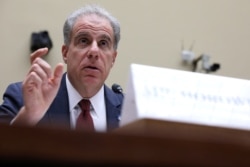A U.S. government watchdog on Tuesday harshly criticized the Drug Enforcement Agency for its response to the opioid crisis, saying that amid a surge in opioid-related deaths the agency failed to use its most powerful deterrent and authorized an increase in pain pill output.
A report released by Justice Department Inspector General Michael Horowitz, whose office is an internal government watchdog, found the DEA was "slow to respond to the dramatic increase in opioid abuse" since 2000.
The report criticized the DEA for cutting back on use of an enforcement tool known as "immediate suspension orders," which allows it to halt pill shipments, between 2013 and 2017.
Horowitz's report also found that between 2002 and 2013 the DEA authorized a 400% increase in production of the opioid oxycodone, and that the agency did not significantly reduce production of the pain pill until 2017.
Nearly 400,000 deaths in the United States have been linked to overdoses of opioids from 1990 to 2017, according to the U.S. Centers for Disease Control and Prevention.
The DEA said in a statement that it appreciated Horowitz's assessment and that it has made improvements intended to control the diversion of opioids.
"Working with United States Attorneys' Offices across the country, an increasing number of individuals and corporations are facing civil and criminal charges for actions that have fueled the opioid crisis," the DEA added.
Horowitz's report said that the DEA, which is part of the Justice Department, had recently taken steps to address the opioid epidemic, including increasing its intelligence sharing with local law enforcement agencies and launching "community outreach efforts" to raise awareness of the dangers of opioids.
Horowitz found that more progress was needed, however, and that the DEA should establish "measurable performance metrics" to determine if some of its efforts were working.
Companies like drug distributor McKesson Corp and Oxicontin maker Purdue Pharma, which have been accused of enabling opioid abuse in many pending lawsuits, have long argued that they abided by the DEA's production quotas and that it was not their place to second-guess the agency's determinations.







